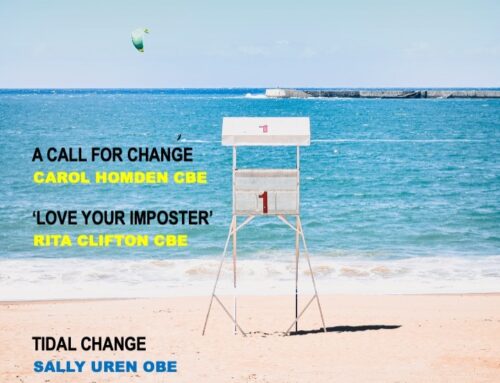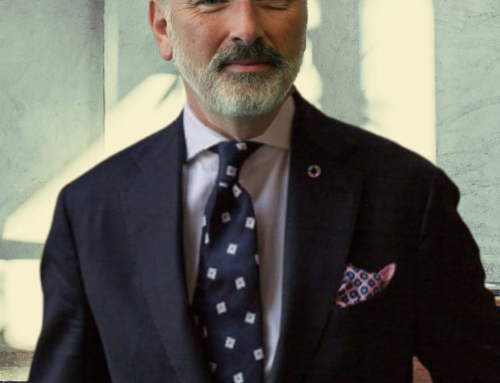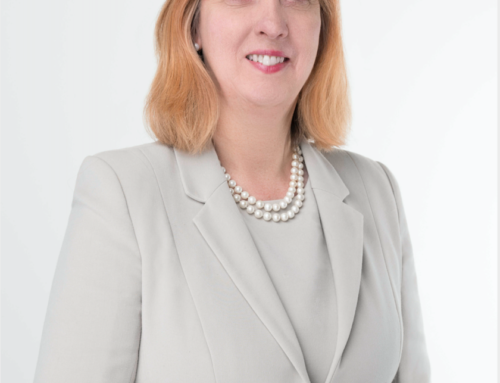The Green Grocer:
One man’s manifesto for corporate activism

I never expected to write a book about how to go green; but then I never expected to become a grocer, either.
My parents founded Iceland Foods in 1970 so I grew up hearing talk of the business every day, but the idea of working for it never appealed to me. Why would anyone set themselves up for daily comparison with a legendary entrepreneur like my dad, Sir Malcolm?
So I very consciously set myself on a completely different career path: studying geography, qualifying as a chartered surveyor and then setting up my own property companies, first in Poland and later in the UK.
A change of direction in my early 30s was inspired by three developments. A buyout restored Iceland to family control; my mother was diagnosed with early-onset Alzheimer’s disease, making me conscious that my own time might be limited and must be used wisely; and my own increasingly serious concerns about the global environment became coupled with an awareness of Iceland’s proven ability to make a real difference through disruptive action.
My father’s coining of the term ‘Frankenstein food’ and leading the drive against GM food in the UK in the late 1990s were at the front of my mind here, along with Iceland’s pioneering of ‘Greenfreeze’ technology to combat the hole in the ozone layer caused by CFCs.
Despite initial paternal discouragement, I joined the family firm as a shelf-stacker in 2012, working my way up to store manager before joining the head office team and ultimately becoming joint managing director, with oversight of all our sustainability initiatives.
I did so fully conscious of my inherited privilege, determined never to take my position for granted and to make the best possible use of it.
From the outset, my priorities have been to help in the fight to reverse climate change and to promote social justice, while also generating a profit. Because in the long run ‘sustainability’ has to mean protecting the jobs of my 30,000 colleagues and permitting the business to survive and prosper, as well as ‘Doing It Right’ for the communities where we operate and for the wider environment.
We’ve captured a lot of headlines with world-leading initiatives designed to combat deforestation, ocean plastic pollution and climate change: pledging in 2018 to remove palm oil from our own label food, and to eliminate plastic packaging from Iceland products by the end of 2023; last year becoming the first UK supermarket to divulge our complete plastic footprint with 100% transparency and calling for other UK supermarkets to join us, while joining with leading campaigners to press the Government to make such reporting mandatory; and this year becoming the first food retailer in the world to sign the Climate Pledge, committing to achieve net zero carbon by 2040 – ten years ahead of the Paris Agreement.
I’ve learned a lot of lessons along the way, not least that there will always be people determined to put the most negative interpretation on everything you do, and to rejoice in your failures – and you can be sure that there will be many of those in any initiative that aims to push against conventional boundaries.
And that’s why I decided to write the book, about my own quest to find purpose with profit, and to help readers with businesses of all sizes to see the value – and indeed the critical importance – of pursuing ethical policies. Because we will never meet the challenges posed by climate change and environmental degradation if they remain the concerns of the chattering and comfortably-off middle classes; we need to ‘democratise environmentalism’ by making it relevant and relatable to everyone – including those whose top priority is simply finding enough cash to feed their families from day to day.
Since I became known as a champion of sustainability, I’ve lost count of the number of conferences I have been invited to fly across the world to attend. At least Covid has clamped down on this for the time being, but in the long run we need to ensure that additional burdens fall on those best able to bear them – that we tax the frequent business flyer, not the family saving for one annual holiday, and that we make the most of the job creating potential of new green industries as we transition away from fossil fuels.
In my book I try to offer clear-sighted advice about how any business can make genuine progress on sustainable initiatives regardless of who their customer is, while being realistic about profit margins, and obligations to shareholders and employees. I’d like to think that my experience is relevant to helping any business – whether a large corporation, a sole trader, a start-up, or a kitchen-table entrepreneur – to make a difference.
I also think it is important for everyone in business to recognise the growing importance of genuine ethics to their workforce and customers; paying lip service to standards and trying to fool the public through ‘greenwashing’ will simply no longer work.
The sheer scale of what we need to do and the speed at which we need to do it can easily seem overwhelming, but all of us need to start somewhere and I’m keen to share some of the important lessons I’ve learnt along the way.
The Green Grocer is split into six chapters covering what businesses need to do, my own specialist subjects of how to eliminate single-use plastic and palm oil, government responsibilities, lessons from Covid-19 and why I am – despite everything – optimistic about the future. Each chapter concludes with key takeaways to provide readers with advice for next steps and fundamental learnings.
What I have tried to set out is a business and leadership philosophy based on looking beyond short-term profit, instead setting seemingly impossible goals and focusing on long-term results to bring about real change, for the good of business, communities and the planet. I have tried to lift the lid on the changes that I believe must happen across the private and public sectors in order to meet the biggest challenges of our time.
Whether you own a company or are interested in what it takes to make a multi-billion pound business greener, I hope you will find The Green Grocer an inspiring read around ethical consumption, sustainability and greener living.
As a tribute to my mother, who was finally defeated by Alzheimer’s disease in January this year, all my own proceeds from the book will be donated to the Iceland Foods Charitable Foundation, which donated more than £17m to dementia research over the last decade.
Richard Walker
Managing Director, Iceland Foods
https:/www.amazon.co.uk/Green-Grocer-manifesto-corporate-activism/dp/0241492238/
Instagram: @richardiceland
Twitter: @icelandrichard
LinkedIn: https://www.linkedin.com/in/richard-walker-iceland/



The Green Grocer:
One man’s manifesto for corporate activism

I never expected to write a book about how to go green; but then I never expected to become a grocer, either.
My parents founded Iceland Foods in 1970 so I grew up hearing talk of the business every day, but the idea of working for it never appealed to me. Why would anyone set themselves up for daily comparison with a legendary entrepreneur like my dad, Sir Malcolm?
So I very consciously set myself on a completely different career path: studying geography, qualifying as a chartered surveyor and then setting up my own property companies, first in Poland and later in the UK.
A change of direction in my early 30s was inspired by three developments. A buyout restored Iceland to family control; my mother was diagnosed with early-onset Alzheimer’s disease, making me conscious that my own time might be limited and must be used wisely; and my own increasingly serious concerns about the global environment became coupled with an awareness of Iceland’s proven ability to make a real difference through disruptive action.
My father’s coining of the term ‘Frankenstein food’ and leading the drive against GM food in the UK in the late 1990s were at the front of my mind here, along with Iceland’s pioneering of ‘Greenfreeze’ technology to combat the hole in the ozone layer caused by CFCs.
Despite initial paternal discouragement, I joined the family firm as a shelf-stacker in 2012, working my way up to store manager before joining the head office team and ultimately becoming joint managing director, with oversight of all our sustainability initiatives.
I did so fully conscious of my inherited privilege, determined never to take my position for granted and to make the best possible use of it.
From the outset, my priorities have been to help in the fight to reverse climate change and to promote social justice, while also generating a profit. Because in the long run ‘sustainability’ has to mean protecting the jobs of my 30,000 colleagues and permitting the business to survive and prosper, as well as ‘Doing It Right’ for the communities where we operate and for the wider environment.
We’ve captured a lot of headlines with world-leading initiatives designed to combat deforestation, ocean plastic pollution and climate change: pledging in 2018 to remove palm oil from our own label food, and to eliminate plastic packaging from Iceland products by the end of 2023; last year becoming the first UK supermarket to divulge our complete plastic footprint with 100% transparency and calling for other UK supermarkets to join us, while joining with leading campaigners to press the Government to make such reporting mandatory; and this year becoming the first food retailer in the world to sign the Climate Pledge, committing to achieve net zero carbon by 2040 – ten years ahead of the Paris Agreement.
I’ve learned a lot of lessons along the way, not least that there will always be people determined to put the most negative interpretation on everything you do, and to rejoice in your failures – and you can be sure that there will be many of those in any initiative that aims to push against conventional boundaries.
And that’s why I decided to write the book, about my own quest to find purpose with profit, and to help readers with businesses of all sizes to see the value – and indeed the critical importance – of pursuing ethical policies. Because we will never meet the challenges posed by climate change and environmental degradation if they remain the concerns of the chattering and comfortably-off middle classes; we need to ‘democratise environmentalism’ by making it relevant and relatable to everyone – including those whose top priority is simply finding enough cash to feed their families from day to day.
Since I became known as a champion of sustainability, I’ve lost count of the number of conferences I have been invited to fly across the world to attend. At least Covid has clamped down on this for the time being, but in the long run we need to ensure that additional burdens fall on those best able to bear them – that we tax the frequent business flyer, not the family saving for one annual holiday, and that we make the most of the job creating potential of new green industries as we transition away from fossil fuels.
In my book I try to offer clear-sighted advice about how any business can make genuine progress on sustainable initiatives regardless of who their customer is, while being realistic about profit margins, and obligations to shareholders and employees. I’d like to think that my experience is relevant to helping any business – whether a large corporation, a sole trader, a start-up, or a kitchen-table entrepreneur – to make a difference.
I also think it is important for everyone in business to recognise the growing importance of genuine ethics to their workforce and customers; paying lip service to standards and trying to fool the public through ‘greenwashing’ will simply no longer work.
The sheer scale of what we need to do and the speed at which we need to do it can easily seem overwhelming, but all of us need to start somewhere and I’m keen to share some of the important lessons I’ve learnt along the way.
The Green Grocer is split into six chapters covering what businesses need to do, my own specialist subjects of how to eliminate single-use plastic and palm oil, government responsibilities, lessons from Covid-19 and why I am – despite everything – optimistic about the future. Each chapter concludes with key takeaways to provide readers with advice for next steps and fundamental learnings.
What I have tried to set out is a business and leadership philosophy based on looking beyond short-term profit, instead setting seemingly impossible goals and focusing on long-term results to bring about real change, for the good of business, communities and the planet. I have tried to lift the lid on the changes that I believe must happen across the private and public sectors in order to meet the biggest challenges of our time.
Whether you own a company or are interested in what it takes to make a multi-billion pound business greener, I hope you will find The Green Grocer an inspiring read around ethical consumption, sustainability and greener living.
As a tribute to my mother, who was finally defeated by Alzheimer’s disease in January this year, all my own proceeds from the book will be donated to the Iceland Foods Charitable Foundation, which donated more than £17m to dementia research over the last decade.
Richard Walker
Managing Director, Iceland Foods
https:/www.amazon.co.uk/Green-Grocer-manifesto-corporate-activism/dp/0241492238/
Instagram: @richardiceland
Twitter: @icelandrichard
LinkedIn: https://www.linkedin.com/in/richard-walker-iceland/






